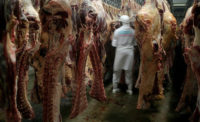Regulations & Legislation
Summer regulatory roundup

Although we anticipate some major developments with upcoming regulations on modernized swine inspection in the coming months, the U.S. Department of Agriculture’s Food Safety and Inspection Service (FSIS) has been relatively quiet the past few months in terms of new regulatory initiatives. There are, however, a few recent noteworthy developments.
FSIS Label Verification of Imported Raw Beef Products
On June 19, FSIS issued Notice 19-19, Label Verification of Imported Raw Beef Products Labeled “For Cooking Only” or “For Full Lethality Treatment.” Notice 19-19 provides instructions for FSIS inspection program personnel (IPP) for conducting verification of imported raw beef products labeled “For Cooking Only” or “For Full Lethality Treatment.”
Per Notice 19-19, when IPP encounter lots bearing “For Cooking Only” or “For Full Lethality Treatment” labeling instructions, they will first review the importer’s documentation to verify that the contracts, bills of lading, letters of guarantee and other agreements ensure the product will undergo cooking or receive a full lethality treatment before being sold to end users. After verifying the importer’s documentation, IPP will use the FSIS Public Health Information System (PHIS) to verify that the destination establishment conducts ready-to-eat processing. After verification, IPP will record an entry in PHIS for the lot indicating it is required to undergo cooking or full lethality treatment.
Notice 19-19 only applies to raw beef that has either not been tested or has tested negative for Shiga Toxin-Producing Escherichia coli (STEC). Raw, non-intact beef and raw beef intended for non-intact use presented for importation that tests positive or is a presumptive positive for STEC is adulterated and is not allowed to be imported.
Registration of meat and poultry handlers
Although this is not a new requirement, based on several recent client interactions, it appears that FSIS may be stepping up efforts to ensure businesses that are not inspected by FSIS, but handle meat and poultry products, register with the agency. Under FSIS regulations (9 C.F.R. §§ 320.5, 381.179), business entities such as brokers, renderers, pet food manufacturers, livestock and poultry feed manufacturers and wholesalers of meat and poultry products are required to register with FSIS. Also, public warehouses that store meat and poultry products, whether intended for human consumption or other uses, must register with FSIS. Likewise, businesses engaged in buying, selling or shipping dead, dying, disabled or diseased livestock and poultry or carcass parts from animals that died by means other than slaughter are required to register. Companies that have a grant of inspection as well as those that operate private warehouses need not register.
Meat and poultry handlers can register by completing FSIS Form 5020-1.
State meat labeling laws
Several states have recently taken preemptive action against the cell-cultured meat industry with laws that would prohibit, and in some cases criminalize, marketing food as meat if it is not derived from a slaughtered animal. In many cases, these laws also target plant-based meat alternatives.
Missouri kicked off this trend in 2018 when it passed major amendments to its meat advertising law. The law made it a crime to advertise a product as meat or poultry if it is not derived from “harvested production livestock or poultry.” Under the Missouri law, a cell-cultured meat product would need to have a qualifier of “lab grown,” “lab-created” or comparable language to appear immediately before or after the product name on the package, as well as the statement “grown in a lab” somewhere on the package. Similarly, plant-based products would need a qualifier of “veggie” or comparable language immediately before or after the product name and a statement of “made from plants” appearing somewhere on the label. The Missouri law is currently tied up in a First Amendment lawsuit; a settlement is expected to be made public in the next month or so.
Seven states followed suit this year. Arkansas, Kentucky, Montana, Mississippi, North Dakota, South Dakota and Wyoming each enacted laws in 2019 meant to target the marketing of cell-cultured meat and plant-based products mimicking meat and poultry products.
These laws will likely end up serving primarily as symbolic gestures of support to livestock and poultry producing constituents, at least with respect to cell-cultured meat products. Under the proposed joint regulatory framework announced by USDA and FDA, FSIS will have jurisdiction over the labeling of cell-cultured meat products. Under the Federal Meat Inspection Act and the Poultry Products Inspection Act, state governments are preempted from requiring any label standards that deviate from federal requirements. States are not similarly constrained with respect to plant-based products, which are inspected by FDA. NP
Looking for a reprint of this article?
From high-res PDFs to custom plaques, order your copy today!






